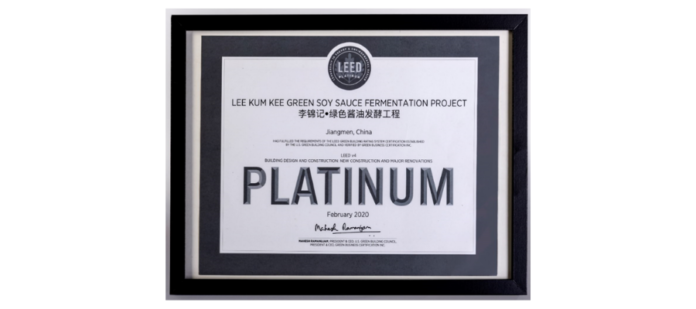
First company in the global fermented food industry to receive LEED certification
HONG KONG (July 20, 2020) – Lee Kum Kee, the leading Asian sauce provider, recently announced its Xinhui Production Base was awarded LEED (Leadership in Energy and Environmental Design) Platinum certification. Lee Kum Kee is the first in the global fermented food industry to receive this certification.
LEED certification is a widely used green building rating system and is a globally recognized symbol of sustainability achievement and leadership. To achieve LEED Platinum certification, buildings must attain a score of 80 or more on a 100-point scale that measures environmental impact.
“The LEED certification is a direct reflection of who we are as a company, both in our commitment to sustainable practices and providing a safe working environment for our team. It’s an honor to receive this recognition for our Xinhui Production Base.” said Tony Mok, Director of Global Manufacturing for Lee Kum Kee.
The Xinhui Production Base is the largest of the Lee Kum Kee production bases worldwide and features a comprehensive energy efficiency and environmental protection strategy and is equipped with a solar photovoltaic power generation system, geothermal heat pump system, wetland park and wastewater treatment facilities.
Sustainable achievements to date include:
- A total of 4,200MWh of electricity from conventional sources was saved by the Solar Photovoltaic Power Generation System, which was installed on the rooftops of four warehouses and the newly built soy sauce plant. 95% of the electricity generated from the system was supplied to the production base and over 212.88MWh of surplus energy was diverted to the public power grid, equivalent to the average monthly electricity consumption of 2,916 local people in Jiangmen, Guangdong.
- A total of 500,615 kWh of energy was saved in 2019 by using the renewable geothermal energy for soy sauce production – its energy efficiency doubles that of an ordinary water chiller system. Harvesting the heating and cooling capabilities deep underground, hot and cold water can be provided for the soy sauce fermentation processes via heat exchangers and condensers, reducing consumption of electricity, water and greenhouse gas emissions.
- Nearly one fifth of treated water was recycled and reused in the overall process and managed to shave off 50% energy and 55% water consumption.
Notably, the solar photovoltaic power generation system and geothermal heat pump system earned full marks in the energy-saving aspect of LEED.
In 2021, the Lee Kum Kee will expand the wetland park around the existing wastewater treatment plant, said Mok.
“By cultivating plants that can remove nitrogen compounds from wastewater, the artificial wetland park has potential to treat 4,000 cubic meters of wastewater daily,” he said. “The artificial wetland park will also boost greenery density of the plant and effectively mitigate urban heat island effects to render the Xinhui Production Base as a sustainable site.”
For more information on Lee Kum Kee, visit https://usa.lkk.com/en/
###
About Lee Kum Kee
Established in China in 1888, Lee Kum Kee is dedicated to promoting Chinese culinary culture worldwide by providing products to local restaurant chains and food manufacturers, as well as making it easy for general public to enjoy authentic, restaurant-quality Asian tastes and flavors at-home, through its delicious line of savory Chinese and Asian sauces and condiments. Lee Kum Kee’s offerings include more than 200 authentic options, such as Soy Sauce, Hoisin Sauce, Oyster Sauce, Sriracha Chili Sauce, Sriracha Mayo and Sesame oil. The company’s rich 132-year heritage, couple with its dedication to adding authenticity and creating flavors that appeal to global clientele, has positioned it as an evolving global market leader and pioneer with a presence in more than 100 countries and five continents. For more information visit https://usa.lkk.com/en/







